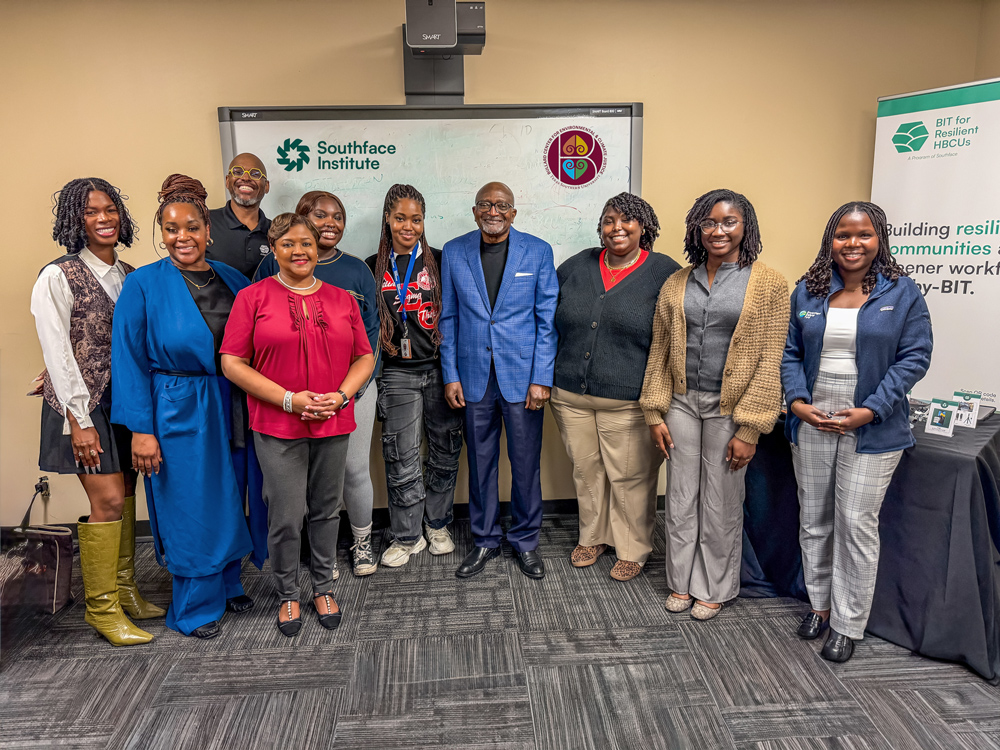Lorem ipsum dolor sit amet, consectetur adipiscing elit. Suspendisse varius enim in eros elementum tristique. Duis cursus, mi quis viverra ornare, eros dolor interdum nulla, ut commodo diam libero vitae erat. Aenean faucibus nibh et justo cursus id rutrum lorem imperdiet. Nunc ut sem vitae risus tristique posuere.
June 28, 2024 – The Bullard Center for Environmental and Climate Justice at Texas Southern University and Deep South Center for Environmental Justice held a two-day HBCU-CBO Gulf Coast Equity Consortium Regional Convening in New Orleans, LA earlier this week focusing on “Flood Risks in Gulf South Communities.” The project is funded by a $750,000 grant from the Gulf Research Program of the National Academies of Science, Engineering and Medicine (NASEM) in partnership with the Robert Wood Johnson Foundation. The grant will help the HBCU Consortium partners implement programs and plans to address at-risk infrastructure, water and flooding issues, health and climate vulnerability and resilience in Gulf South communities.
The project is led by Dr. Robert D. Bullard (Bullard Center) and Dr. Beverly Wright (Deep South Center) who also serve as Co-Leads of the HBCU Consortium. The urban and rural communities selected for this initiatives have a range of shared experiences and infrastructure challenges: highway expansion development, flooding (stormwater management, subsidence, stormwater management, drainage, overflowing sewer and septic systems, loss of protection (levees, wetlands, green space), highway expansion and residential displacement, damage to homes, loss of use of property, legacy pollution, and social and environmental determinants of health—including mental stress. The Gulf South communities participating in the project include the following:
Reverend James L. Caldwell
COCO – Fifth Ward (Houston, TX)
Website: https://www.cocohouston.org/
Facebook: https://www.facebook.com/coalitionofcommunityorganizations/
Bridgett Murray
ACTS - (Houston, TX)
Website: https://acts-organization.o
Facebook: https://www.facebook.com/pleasantvilleorg/
Katherine Egland
EEECHO – Turkey Creek (Gulfport, MS)
Website: https://www.eeecho.org/
Facebook: https://www.facebook.com/eeechogulfcoast/
Quisha Reed-Jones
Alsen St. Irma Lee Community Village (ASILCV) (Alsen, LA)
Website: https://www.alsencommunityvillage.org/
Facebook: https://www.facebook.com/justiceforalsen
Major Joe Womack (ret.)
CHESS – Africatown (Mobile, AL)
Website: https://www.africatown-chess.org/tag/joe-womack/
Facebook: https://www.facebook.com/AfricatownCHESS/
Pastor Timothy Williams
Shiloh Community Center – (Elba, AL)
Website: https://shiloh-community.org/
Facebook: https://www.facebook.com/profile.php?id=61551725073390
Diane Steele
Strain Road Community/NAACP – (Athens, AL)
Website: https://alnaacp.org
Facebook: https://www.facebook.com/ALSTATENAACP/
Rashida Ferdinand
SANKOFA – Lower Ninth Ward (New Orleans, LA)
Website: https://sankofanola.org/
Facebook: https://www.facebook.com/sankofanola504 & https://www.facebook.com/justiceforalsen
The core HBCUs Consortium schools supporting this project include: Texas Southern University, Dillard University, Jackson State University, Alabama A&M University, Florida A&M University, and Tennessee State University.
The Consortium uses the Communiversity Model as its theoretical underpinning and matches HBCUs with CBOs—allowing faculty mentors and students to work collaboratively with our community partners to use community science, community-based participatory research (CBPR), and “train-the-trainer” methodologies to increase environmental health literacy, build capacity and solve pressing environmental health challenges, such as toxic air pollution, contaminated sites (superfund sites/brownfields), water contamination, disaster preparedness, infrastructure, flooding, and climate resilience.
Climate vulnerability in the U.S. is greatest in the Deep South, where over 57percent of Black Americans now live. Decades of racial segregation relegated millions of Black Americans to living in neighborhoods that are more vulnerable to flooding. Disadvantaged communities contain nearly twice as many at-risk infrastructure assets per capita as non-disadvantaged communities. Black residents live in communities with the greatest number of at-risk infrastructure assets impacted by flooding compared to the national average. A large share of these glaring disparities observed today can be traced to Jim Crow segregation and structural racism.
Climate driven flood risks in the United States will increase by about 25 percent by2050, and Black communities in the South and Gulf Coast will face a 40 percent increase in flood risk in places where at least one fifth of the population is Black. Redlined homes face 25 percent higher flooding risks than non-redlined homes. This is especially problematic since more than 58 percent redlined Black neighborhoods suffer the greatest harm when storms hit.
Our Consortium is focused on real solutions. HBCUs have a wealth of talented and experienced educators, scientists, professionals and dedicated community partners who have been called upon over the years to provide a variety of technical assistance and support. Today, the crisis is climate change and the devastating impact on our most vulnerable communities that are also overburdened with pollution and other environmental health threats. HBCU sheard the cry and stepped up early when many other universities failed to seethe urgency of those on the frontline of climate assaults. While we have made some progress, we still have a long way to go to address the climate gap that’s leaving too many people of color and poor communities behind.
Based on the track record of HBCU-CBO Consortium, we plan on leveraging our partnerships, resources and expertise to apply for an EPA Community Change Grant Track II Meaningful Engagement for Equitable Governance ($3 million) to supplement capacity building of our disadvantaged communities to evaluate and redress environmental and climate injustices and give these communities a meaningful voice in governmental decision-making processes. Some of the activities we will be seeking supplemental funding for our regional collaborative include education and training programs, collaborative governance, and participation in governmental funding and budgeting processes that support solutions to legacy pollution, waste sites, wastewater treatment plants, schools, public housing, parks and green space, power plants, and at-risk infrastructure assets in Gulf South communities. Residents in these communities face elevated risks of being regularly flooded and systematically neglected by government.
And as Dr. Martin Luther King, Jr. stated in 1968, “the arc of the moral universe is long, but it bend toward justice.” Our HBCU-CBO led project seeks to bend the arc of these environmental, climate and health challenges toward justice.
.png)





